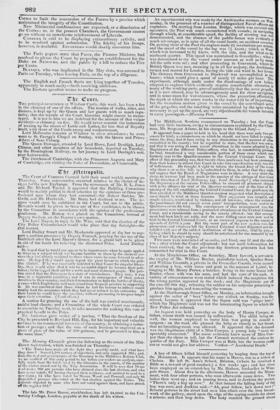jtirtropolis.
The Court of Common Council held their usual weekly meeting on Thursday. Some conversation occurred relative to the choice of de- signs fbr the new Exchange. From the statements of Mr. R. L. Jones and Mr. Richard Taylor, it appeared that the Building Connuittee would be mainly guided in their selection by the opinions of three pro- fessional men whom they had consulted—Sir Robert Smirke, Mr. Gwilt, and Mr. Hardwick. Mr. Barry had declined to act. The de- signs would soon be exhibited to the Court, but not to the public. Rewards would be given to three out of five candidates, to be chosen by the Committee In accordance with the opinion of the professional gentlemen. Mr. Burton was placed on the Committee, instead of Deputy Godson, on the Deputy's own motion.
The Lord Mayor, in reply to Mr. Wire, said that the election of the City Police Commissioner would take place that day fortnight—the 31st instant.
Lord Dudley Stuart and Mr. Mackenzie appeared at the bar to sup- port a petition presented by Deputy Peacock, praying for the use of the Guildhall after the Lord Mayor's dinner, for a grand ball to be given in aid of the funds for relieving the distressed Poles. Lord Dudley said— tie hoped that he would not appear to be importunate when he again applied to them on a subject which was become familiar to them by the eminent ser- vices they had already rendered to tho.,e whose cause he came forward to advo- cate. Ile hoped they would again n:pcat the great favour to which the peti- tion alluded. If he was constantly. indebted to that Court for singular libera- lity, they would allow that it was lbr no sordid object he became their peti- tioner; for he begged their aid for a noble and most distressed people. The peti- tion stated that the Poles were in a state of wretchedness. They were, it was true, in a deplorable condition ; and. it was in consequence of their ardent devotion to their country, and their determination to fight the battles of liberty, a cause which Englishmen well understood from frequent practice in supporting it. lie was convinced that those whom he had the honour to address would. readily lend the assistance which they had never refused to his entreaties. In their hands be would leave the qinstion, without presuming to trespass longer upon their attention. (Loud chars.)
A motion for granting the use of the hall was carried unanimously, amidst loud cheers ; and a Committee of the whole Court was ordered to assemble on Tuesday next, to take measures for making this vote of practical benefit to the Poles. Mr. Andcrton gave netice of a motion, " That the freedom of the City be presented to Rowland Hill, Esq., for his important and valuable services to the commercial interests of the country, in obtaining a reduc- tion of postage; and that the vote of such freedom be engraved on a piece of plate of the value of 100 guineas, and be presented to him at the saute time."


























 Previous page
Previous page